By Sue Vaughan
April 9, 2010
If you’ve gotten on a 38L recently and noticed newspapers strewn about, banana peels here and there and graffiti all over the floor from front to back – as I did recently – there’s a reason: in response to ongoing budget deficits, the San Francisco Municipal Transportation Agency (SFMTA) cut 14 transit car cleaners on January 25, leaving 84.
The deficits the agency has faced are real – $128.9 million last year, $12.1 million for FY 2010, and $19 million for FY 2011, and SFMTA staff has been working hard to find revenue.
“We’ve done all that we can to try to cover that gap and close that gap,” said SFMTA Executive Director Nat Ford on April 6 at San Francisco County Transportation Agency Plans and Programs Committee meeting.
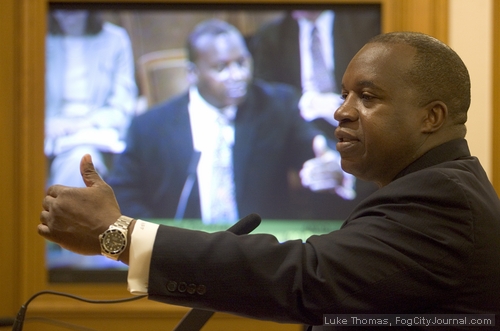
SFMTA Executive Director Nathaniel Ford
But have they?
Extended the Hours of Parking Meter Operation
The agency, under the direction of the seven members of the SFMTA Board of Directors, all mayoral appointees, is continuing to resist expanding the hours of parking meter operation, a practice that could bring in about $9 million annually.
Yet other solutions – including 10 percent service cuts that are to go into effect around May 1 and buses wrapped with advertisements – are still on the table. In addition, on March 30, the directors voted 5 to 2 to declare a fiscal emergency for the FY 2011 fiscal year – continuing the emergency they had declared nearly a year before. That declaration gives them leeway to institute more service cuts should the need arise in the next year without conducting environmental impact reviews. (Directors Shirley Breyer-Black and James McCray voted against the declaration.)
I serve on the Municipal Transportation Agency Citizens Advisory Council (MTA CAC). At our April 1 Finance and Administration subcommittee meeting, extended parking meter hours – both on Sundays and weekday evenings, for $9 million – were included in the list of possible solutions that staff would present to the Board of Directors at their April 6 meeting. (The council recommends going to extended hours in places where the parking vacancy rate falls below 20 percent.)
Parking meters were originally installed in commercial parts of the city in 1947 to help businesses by encouraging turnover. In 1947, stores were closed on Sundays, and since that is no longer the case, one would think that meters should have been in operation on Sundays for years – and on weeknights in neighborhoods with restaurants and theaters. After all, charging for parking, while more expensive, reduces the amount of time that people spend circling in search of parking and is thus easier on both people’s lungs and psyches.
But by April 5, at the full MTA CAC meeting, weekday evening hours had been removed from the list of possible solutions, and in any case, the final budget calculations presented to the Board of Directors on April 6 did not include even extending the hours of parking meter operation to only Sunday (see the PDF for Item 11 on the Agenda for the April 6 meeting) – indicating there must be some powerful people behind the scenes who are resisting the proposal to expand the hours of parking meter operation.
In fairness, there is a proposal to move forward with a pilot project to test expanding the hours of meter operation in a few commercial districts in the City in conjunction with the agency’s SFPark program.
“The main thing I’m looking for is business feedback,” said Director Malcolm Heinicke at the March 30 meeting. “Are we gaining a couple of quarters in revenue versus depleting the sales tax revenue?”
But what about transit riders?
“I used to ride Muni,” said former Muni bus rider Beth Byrne. “I lived in the Haight and I bought a monthly pass.” But when the price of the pass went up to $55, she stopped purchasing the pass. “It was too expensive and too time consuming for me to get to work.”
I can say the same for myself. Last summer, when the price of the pass went up to $55, I stopped buying the pass, and switched primarily to my bicycle. (As a member of the MTA CAC, I now get a free pass.)
Ballot Measures
The members of the Board of Directors have the power to put revenue-generating measures on the ballot, but they never have. However, in recent weeks, ballot measures have become a topic of conversation at Board meetings, especially at their April 6 meeting:
From Director James McCray:
“Whichever one we focus on, we need to focus on one that will give us the biggest boost.”
From Director Bruce Oka:
“If [a successful ballot measure] doesn’t bring us continual revenue, I don’t think it’s going to be very useful.”
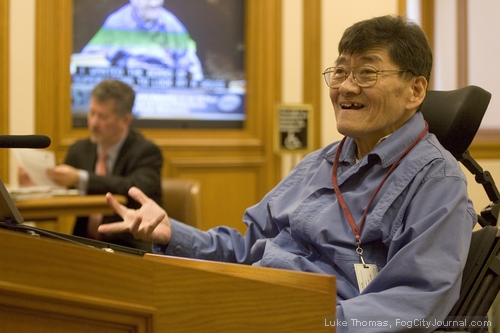
Director Bruce Oka
From Director Malcolm Heinicke:
“I agree with that in theory. I disagree in practice. I think the reality is, it seems like we’re playing catch up. We need to make a personal commitment to make the budget our priority. … If we’re going to do anything for the ballot, it has to be for November. The only [ballot suggestion] that will fly will be the commercial off-street parking tax put on by the Board of Supervisors … sunsetted after two years.”
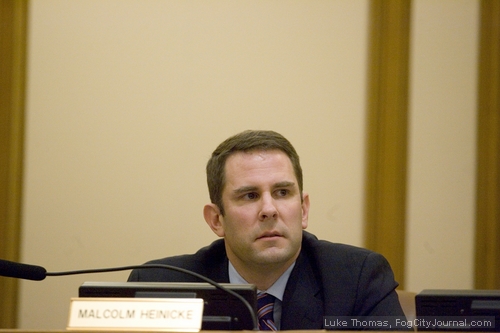
Director Malcolm Heinicke
From Executive Director Ford:
“What are you trying to accomplish? Short-term survival or an opportunity to enhance the system to industry-level standards of maintenance? … Are we looking at what we need for the next couple of years or long-term?”
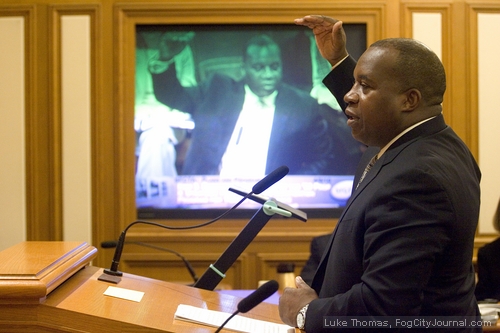
SFMTA Executive Director Nathaniel Ford
From Board of Directors Chairman Tom Nolan:
Regarding “Commercial off-street parking taxes, someone’s got to take this and run with it. … We’d like to see if there’s any interest at the Board of Supervisors.”
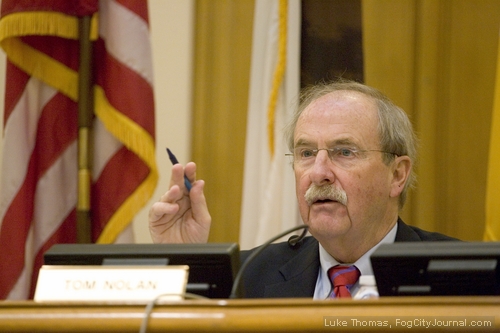
Board of Directors Chair Tom Nolan
From ED Ford:
“We could give you a document with pros and cons and a discussion of strategy before May 4.”
From Director Shirley Breyer-Black:
“Who’s going to do the political campaign? Who will make sure it will pass?”
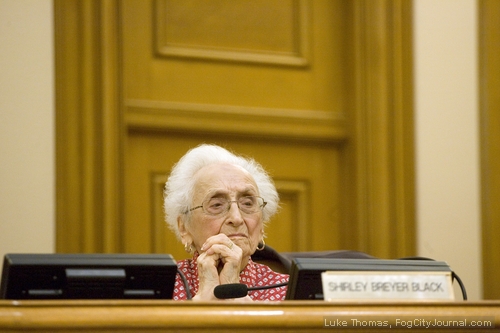
Director Shirley Breyer Black
Seven million dollars from the SFCTA?
The agency has also asked for a one-time allocation of $7 million from the San Francisco County Transportation Authority (SFCTA) Proposition K sales tax funds for vehicle maintenance.
At the transit agency in Atlanta, Georgia, where Ford previously worked, plans for vehicle maintenance were made as a part of each vehicle purchase. When he arrived at Muni four and a half years ago, there were no plans to rehabilitate many vehicles.
“The agency,” he said, “is now working on the sins of the past to try to correct those problems.”
According to SFCTA Executive Director Jose Luis Moscovich, however, a legal opinion delivered to the SFCTA Plans and Programs Committee on April 6 is “not a particularly favorable opinion.”
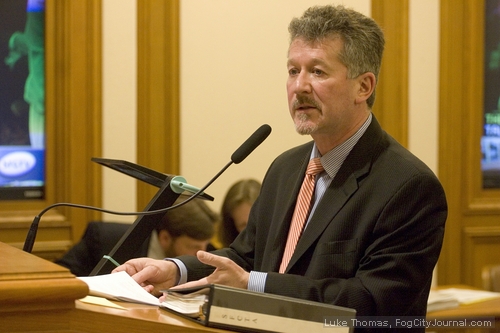
SFCTA Executive Director Jose Luis Moscovich
In fact, the opinion states:
While certain expenditures on maintenance are allowed, the [Proposition K Transportation Expenditure Plan] specifically limits eligibility for maintenance funds, stating that operations and maintenance expenditures “shall be limited exclusively to incremental costs associated with the operation of new transportation services and/or facilities, as specified in the TEP”.
The San Francisco Board of Supervisors will consider an appeal of the exemption from California Environmental Quality Act requirements for environmental impact review – created by the April 2009 declaration of fiscal emergency – of the 10 percent service cuts planned for about May 1, at its meeting on April 13, 2010. The appeal is Agenda Number 25, Item 100288.
The SFMTA Board of Directors has rescinded a proposal to create $70 premium express bus and cable car passes in response to Governor Schwarzenegger’s signature on the gas tax swap.
The directors may adopt a budget for FY 2011 on April 20. If they do not, they will meet again on April 30 to reconsider adopting a budget. The budget will then go to the supervisors. Seven out of the 11 supervisors can vote to reject the budget.


 The Hunger Site
The Hunger Site
April 18, 2010 at 9:16 am
Foggers,
Ford is a typical ‘kiss up/kick down’ house negro who has called everyone who gave information for pieces like this a “snitch”.
h.
April 12, 2010 at 5:21 pm
Howard, I am no Republican but probably share a preference for fiscal conservatism, transparency, and accountability in all matters financial and otherwise.
But that’s where I draw the line. If I understand Republicanism correctly, Republicans are generally anti-tax, favor private wealth and property over the common good, and are indifferent at best to social, educational, environmental, and economic inequalities. None of these mean Republicans are more efficient than non-Republicans or in any way good with money. Look at what happened to this country under Bush and Cheney — they took a surplus and turned it into tax breaks primarily for the wealthy and imperial wars.
Republicans and Democrats alike share the blame for the mortgage crisis and the current recession — as well as the decision in the 1990s to deregulate energy in California, precipitating the energy ‘crisis’ just when Bush and Cheney were making their run for the White House.
Hope, did I defend the fact that I have a pass that gets me on Muni for free? I had no idea that was a perk of the position when Eric Mar first appointed me. In fact, the day before I went to my second meeting with the council, I had loaded up $60 onto my Translink card. Then at the second meeting I was asked if I had gotten my pass. I hadn’t and went off and got my photo taken and so on — and I now have a pass that gets me around on the system for free.
Should the agency be considering all the individuals who get free passes? Why not? After all, free parking in the Performing Arts garage and the Civic Center garage has been eliminated, and I’m working hard on the elimination of free on-street parking after hours and on Sundays. (In fact, I don’t think parking should be free anywhere anytime — I’m philosophically opposed, recalling my year in Providence, RI where there was no such thing as overnight on-street parking. In Providence, I had to move my car every night to the parking lot across the street (and I paid for my space) and then move it back out the following morning).
April 12, 2010 at 7:45 am
Hope, obviously you didn’t read my post.
“The Muni has problems with management as well as labor problems.”
“In addition to fixing the union problems they need to fix the management problems.”
Exactly where did I “attack the reputation of the operators?” The work rules are the problems that need to be fixed. Their contract should be negotiated like all others.
Charging Sue for her Fast Passes won’t solve anything. Giving the pass is simply a way of saying “Thanks.”
Being fiscally conservative means controlling spending and watching where the money goes. Its a foreign concept at City Hall. If San Francisco had a Republican BOS and MTA the City would be much better run for a whole lot less.
April 10, 2010 at 6:04 pm
Every free ride is lost revenue from that ride whether $60 for a pass or $2.00 for a ride, not a $1.00 expense. We can’t make excuses for every extra perk. There is no one solution that is going to generate one big lump sum of money – it has to come from pooling many smaller sources.
And, aren’t Republicans supposed to be fiscally conservative? So, attack the reputation of the operators who can make the buses move and cut education but, god help us, make sure the MTA managers who are able to pay don’t have to pay for a ride to fund their own agency?
April 10, 2010 at 4:53 pm
The Muni has problems with management as well as labor problems. The E.D., who makes $300,000+ and a housing allowance, couldn’t make the buses run on time. So, they recently brought in someone else at $225,000 or 250,000 to make the buses run on time. That’s over $500,000 annually to make the buses run on time. In addition to fixing the union problems they need to fix the management problems. The solution: for only $275,000 plus 1/2 of the housing allowance they can have me. The buses will run on time.
I know people on city commissions and boards. They do a heck of a lot of work for no pay. The least the city can do is give a little something like a fast pass. The only real cost is the cost of printing, which is nowhere near $60. Probably under $1.00.
April 10, 2010 at 2:52 pm
Any and all savings are necessary when an agency declares a fiscal emergency. NO excuses, especially from those not absolutely essential to operations. Sounds like you don’t want management to have fringe benefits unless the management happens to be yourself.
April 10, 2010 at 1:59 pm
Ok, let’s do the math here. There are 15 members of the MTA CAC. The passes we get that permit us to board buses and light rail for free (and presumably the cable cars as well — I have not yet tried the cable cars), are worth $60. The passes do not permit us to ride on BART. So 15 x $60 = $900. And $900 x 12 months of the year = $10,800. That is not a lot of money. However, I suspect there are others who also ride for free, but I don’t know. If all free passes were eliminated, there could be some meaningful savings for the agency.
On the other hand, fare recovery right now accounts for about 20 percent, more or less, of the agency’s revenue. With an operating budget of somewhere in the neighborhood of $750 million (that’s down from previous years because of service cutbacks and laid off workers), if we went to free Muni, we could eliminate Proof of Payment officers. But we would have to get something passed at the ballot to make up for the money lost in fares (somewhere between $150 and $200 million) or perhaps a combination of measures — a citywide transit assessment tax, taxes on off-street commercial parking and so on.
April 10, 2010 at 11:51 am
I agree. I serve on a citizen’s advisory committee and we get nothing free except a half sandwich, small bag of chips and water or a soda at meetings 4 times per year.
Also, whoever makes the changes should HAVE TO RIDE MUNI, at least half of the time. They said they were going to fix the problems on the 38, and what they have done is to add more 38L’s in the middle of the da, 38L’s that pass up riders waiting for a regular 38, and they are always less than half full when I see them.
They need more regular 38’s at those times of day, run more L’s during rush hours. Little old ladies (me included) do not need L’s to go grocery shopping. They usually drop them off too far from their homes to carry groceries.
Also, why doesn’t MUNI hire from within? Are there no qualified candidates from within for ED? I can’t stand that the city headhunts in the rest of the country for their higher paid folks. This city should be made to hire from within!!!!!! Especially MUNI. They come here from wherever after college and pretend to KNOW SAN FRANCISCO. And they lie, I have caught them is a few. Give me an effin’ break, please!
April 9, 2010 at 10:21 pm
With all due respect, no members of MTA’s management, whether Directors or CAC members, should be receiving free rides without qualifying for some kind of hardship application during this extreme financial crisis.
April 9, 2010 at 10:08 pm
why are service cuts the only option here…why not cutting the ridiculous salaries?! That MUNI director makes in excess of $350K a year and drivers are up there at $90k is irresponsible when departments across the city are cutting deep into services to fill budget shortfalls. As a city/county San Francisco has to learn and DO more with less. ACROSS THE BOARD!
April 9, 2010 at 9:38 pm
Thanks for your dedication to this issue, Sue. I’m trying to draft two or three paragraphs for the national Green Party’s platform on Africa and mass transit, to reduce our hunger for Africa’s resources, secured by war, is one of the best things I can suggest.